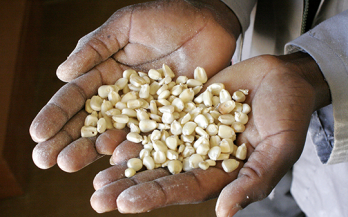- 08/06/2018
Rice production is invariably related to food insecurity which translates to the food shortage or lean periods. The objective of this study was to compare the effect of two major rice harvest seasons and the post‐aus rice harvest period on household food insecurity along with the contribution of relevant household characteristics.
- 28/11/2015
The objective of this study was to assess the effect of sodium iron ethylenediaminetetraacetate (NaFeEDTA)-fortified soy sauce on anemia prevalence in the Chinese population.
- 21/08/2017
The purpose of the study was to examine whether access to an at-scale, group-based parenting education program (“Educación Inicial”) had differential effects on parenting behaviors and child cognitive development according to mother's age at the birth of her first child, with a focus on adolescent mothers in rural Mexico.
- 01/09/2017
The objective of this study was to assess whether improving iron intake with double fortified salt would improve food intake, resulting in higher energy, nutrient intakes, and weight indicators of female tea plantation workers.
- 01/09/2017
The objective of this study was to describe the determinants of aflatoxins exposure, using urinary aflatoxin M1 biomarkers and data generated by the Sanitation Hygiene Infant Nutrition Efficacy (SHINE) trial for rural Zimbabwean women in early pregnancy.
- 01/04/2018
The state of Gujarat had introduced Extruded Fortified Blended Food as take-home ration for children 6–35 months of age. The study aimed to understand awareness, availability, and consumption pattern of Balbhog.
- 01/02/2018
This paper describes the rationale and methods used in setting up a multi‐country study that aimed at designing the key maternal and neonatal health interventions and identifying indicators related to inputs, outcomes, and impact.
- 24/11/2015
Accurate data on nutrition and health is largely lacking in many countries, which compromises the targeting of nutrition interventions to those in need. The objective of this study was to highlight the lack of data available to measure and track micronutrient status.
- 12/04/2017
The efficacy of a number of interventions that include fortified complementary foods (FCFs) or other products to improve infant and young child feeding (IYCF) is well established. This article reviews key findings from 11 coverage surveys of IYCF programs distributing or selling FCFs or micronutrient powders in 5 countries.
- 12/04/2017
Large-scale food fortification (LSFF) of commonly consumed food vehicles is widely implemented in low- and middle-income countries. Many programs have monitoring information gaps and most countries fail to assess program coverage. The aim of this work was to present LSFF coverage survey findings from programs conducted in 8 countries between 2013 and 2015.









